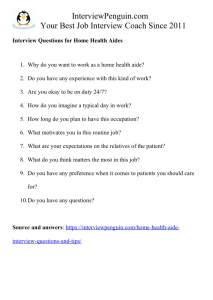Table of Contents
Why do you want to work as a home health aide?
The key is to show some enthusiasm for the job you will do. You can say that you feel close to seniors, that you see a meaningful purpose in this work, or even that it fascinates you to work with another generation, helping them in the winter of their life.
Head on heart, this is neither the best paying job nor the easiest one. Without a right attitude and true desire to do your work well, you will either burn out and quit, or you will suck as a care giver. Convince the hiring managers (or the agency recruiters) that you see a purpose in this work, and do not apply only because you are struggling with money.
Do you have any experience with this kind of work?
Many job applicants can’t exactly imagine what it means to provide home care, especially if the patient suffers from dementia or from other mental illnesses (which is the case more often than not). Therefor, at least in the eyes of the interviewers, any experience helps.
Perhaps you volunteered in a nursing home, or helped your grandpa with daily hygiene, or spent some nights next to the hospital bed. Mention any sort of experience you have with helping someone old or sick. And try to show some empathy in the way you talk about your experience.
Are you okay to be on duty 24/7?
In my opinion, the toughest aspect of this job is that you (nearly) always have to be diligent and ready. You can’t really follow a certain sleeping habits, or another routine. And you do not really have an off day, until your cycle ends, and a new care giver comes to replace you for the coming seven/fourteen days.
Anyway, if you want this job, you should do your best to convince the interviewers of being ready. Any relevant experience will help–experience with long shifts in a job you had before. Ensure the interviewers that a lack of sleep and lack of routine won’t have a negative impact on your work, and your attitude to the client.
Special Tip: Download the full list of questions in a one page long PDF, and practice your interview answers anytime later:

How do you imagine a typical day in work?
They want to understand whether you see the job realistically, and know what will be expected from you. The key is to stress that you plan to be on duty 24/7. And you should mention all duties, most importantly the one that are considered difficult, or even unpleasant.
Changing diapers, helping with personal hygiene, helping with bathing, feeding your client, etc. Show the interviewers that you are ready for the difficult tasks, but do not forget on the human aspect of the job. Listening to the client, giving them emotional support, talking about topics they enjoy talking about, etc is equally important, if not more.
Some home health aide jobs include duties such a laundry, house cleaning, and cooking. This depends on the job description though. If they expect you to take care of cooking and laundry, you should mention doing it in your description of a typical day in work.
* May also interest you: Social work interview questions.
How long do you plan to have this occupation?
Here we come to the common problem. It is not easy to work as a home health aide for a long time, primarily from practical and health reasons. Once you have your own family, it is difficult to leave them for an entire week, or even two weeks, spending your time in a different house, without your husband/wife and children. While Skype and phone helps, we can’t replace personal contact.
What is more, the job is physically and mentally demanding. Our bodies like routine, and uninterrupted sleep. To work week on/week off, or two weeks on/two weeks off, and 24/7 on a shift is tough to handle for everyone.
Hiring managers are aware of these difficulties. It makes no sense to tell them that you plan to do this work for the next five years, since it just won’t happen (exception only proves the rule). And they even do not expect it from you.
But you can tell them that you understand the importance of having the same care givers, for the relationship they have with the patient, and because it takes time until home health aides can understand the physical and emotional needs of the people they provide care for. You can say that you plan to have the job until your body and mind allows you to, and hope it will be longer than a few months.
What are your expectations on the relatives of the patient?
As a great care giver, you shouldn’t have much expectations on either your patients, or their relatives. Of course they should help you, instructing you on the work and the needs of their loved ones. At least they should care.
Nevertheless, the right attitude to this job is having great expectations on a single person–on yourself. Tell the interviewers that you prefer to focus on your own job, and will try to do it as well as possible. What the others do, and how they approach the roles they have in their lives is something you cannot control.
What do you think matters the most in this job?
In my opinion, the relationship you have with the patient, and your attitude to the job (seeing the meaningful purpose in it and sincerely trying your best every day) are the two most important things.
Once the basics work, you will typically address both their needs and their desires in a correct way, in any given situation.
Do you have any preference when it comes to patients you should care for?
If you prefer to care for men (or women), you can definitely say it in an interview. Agencies that recruit home health aides will always work with both male and female clients, and their database is large enough for you to make this choice.
On the other hand, I suggest you not to point out a certain medical condition, such as Alzheimer disease, or Dementia, calling it a showstopper. These conditions are just too common, and you also won’t make a good impression with such an answer in an interview.
Do you have any questions?
If anything is unclear, ask them. Ask them about the working patterns, the shift patterns, payment schedule, transfer to the place of work, and other things. Once you sign a contract, it will be too late to discuss the conditions.
Anyway, asking questions shows that you are sincerely interested in the job, and want to learn more. It will never hurt your chances in an interview…
May also interest you:
- Dietary aide interview questions.
- Social Work interview questions – Learn how to convince the interviewers that you have the right personality for the job in social sector.
- NHS interview questions.

